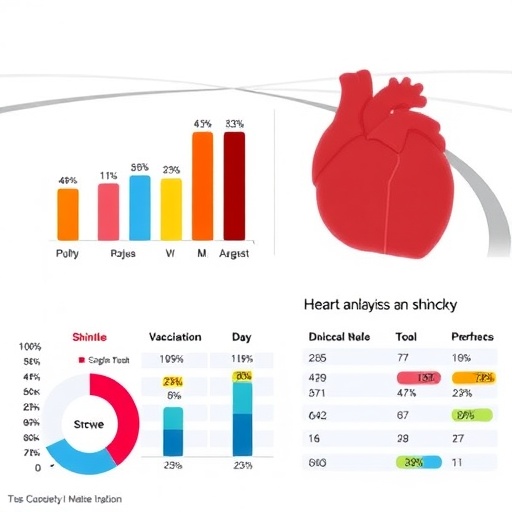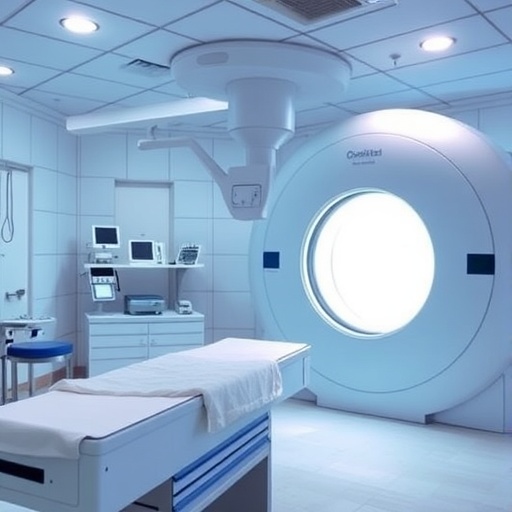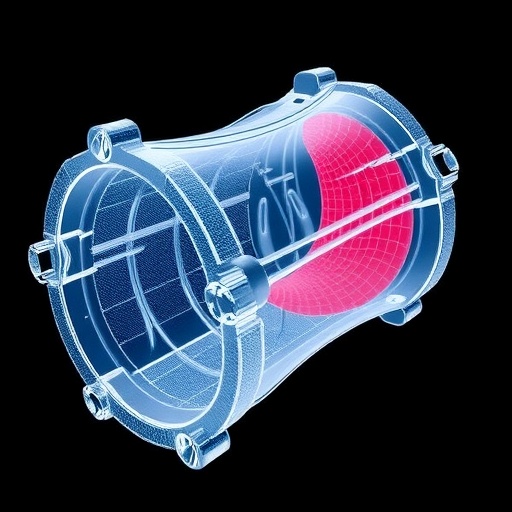
A groundbreaking global meta-analysis presented at the 2025 European Society of Cardiology Congress has unveiled a compelling association between herpes zoster vaccination and a significantly reduced incidence of major cardiovascular events, namely heart attacks and strokes. This extensive systematic review, encompassing data from nineteen studies worldwide, marks the first comprehensive effort to quantify the cardiovascular benefits potentially afforded by immunization against herpes zoster, the virus responsible for shingles.
The research meticulously integrated findings from both phase 3 randomized controlled trials and observational studies, rigorously selected in adherence to Cochrane methodological standards to ensure robustness and reliability. Despite the inherent limitations posed by the predominance of observational data, the analysis revealed a consistent trend: individuals vaccinated against herpes zoster exhibited an 18% reduction in the risk of cardiovascular events among adults aged 18 and above, while those aged 50 and older experienced a 16% risk reduction. These percentages translate into 1.2 to 2.2 fewer cardiovascular incidents per 1,000 person-years, indicating a meaningful absolute risk diminution.
Shingles arises due to the reactivation of the varicella-zoster virus (VZV), which lies dormant in neuronal ganglia following primary infection, typically contracted as chickenpox. The pathophysiology of herpes zoster involves viral invasion not only of the cutaneous nerves but also of cerebral blood vessels. This invasion fosters vascular inflammation and remodeling, subsuming both large and small caliber vessels, which can precipitate ischemic events such as stroke. Consequently, the neurovascular impact of VZV reactivation has been implicated as a transient inciter of heightened cardiovascular risk, which the new findings suggest may be mitigated by vaccination.
Two main types of herpes zoster vaccines were evaluated: the recombinant zoster vaccine (RZV), which employs a subunit adjuvanted platform, and the live attenuated zoster vaccine (ZVL). Both demonstrated an association with lowered cardiovascular risk. The mechanism by which vaccination might confer cardioprotective effects remains speculative but could involve attenuation of viral reactivation episodes, thereby reducing systemic inflammation and endothelial injury – recognized contributors to atherothrombosis and vascular events.
While the meta-analysis provides quantitative evidence supporting a promising correlation, causality cannot yet be established conclusively. The predominance of observational study designs introduces susceptibility to confounding factors and biases, underscoring the imperative for randomized controlled trials specifically powered and designed to evaluate cardiovascular outcomes following herpes zoster vaccination. Further mechanistic studies might elucidate the immunopathological interactions between VZV and vascular endothelium, enhancing our understanding of the vaccine’s potential role in cardiovascular disease prevention.
Cardiovascular disease continues to be the leading global cause of mortality, responsible for over three million deaths annually. Conventional prevention strategies focus heavily on modifiable risk factors such as hypertension, dyslipidemia, and diabetes management. However, the novel intersection between infectious disease prevention and cardiovascular risk modulation opens avenues for expanding prophylactic interventions. The recent 2025 ESC clinical consensus statement endorses vaccines as the potential “fourth pillar” in cardiovascular disease prevention alongside pharmacological measures, reflecting growing appreciation for their role in systemic health maintenance.
Epidemiological data have previously indicated a transiently elevated risk for stroke and myocardial infarction within months following herpes zoster episodes. This temporal association suggests that preventing shingles might reduce the incidence of acute vascular events mediated by viral-induced inflammation and vessel wall damage. The present meta-analysis strengthens the epidemiological narrative by systematically aggregating the global evidence base, thereby adding statistical weight to the notion that vaccination confers cardiovascular protection beyond its primary role in infection avoidance.
In terms of study population, the meta-analysis included over half male participants with mean ages spanning from approximately 54 to 74 years, providing insights relevant to adults across a broad age spectrum. Yet, the generalizability of the findings to high cardiovascular risk groups remains uncertain, given that the included studies primarily targeted the general population for shingles prevention rather than focusing on patients with existing cardiovascular disease or significant comorbidities.
Dr. Charles Williams, leading author and Global Associate Medical Director at GSK, emphasized the encouraging nature of these findings while cautioning that further inquiry is essential. He highlighted the necessity for additional research to firmly delineate whether the observed cardiovascular benefits are directly mediated by vaccination or represent associative artifacts. In particular, randomization and long-term follow-up are needed to segregate vaccine efficacy in cardiovascular endpoints conclusively.
Biologically, VZV’s predilection for vascular tissue likely involves viral-mediated vasculopathy characterized by inflammation-induced endothelial dysfunction, thrombogenesis, and vascular remodeling. Intervening with vaccination may blunt such pathological processes by preventing viral reactivation or priming the immune system to respond more effectively, thereby diminishing systemic inflammation and subsequent cardiovascular risk. Unraveling these mechanistic pathways remains a critical frontier for cardio-immunological research.
The confluence of infectious diseases and cardiovascular health is increasingly recognized as a vital junction wherein immunological interventions offer novel therapeutic and preventive potential. The aspiration to incorporate vaccination into mainstream cardiovascular prevention paradigms reflects a paradigm shift, recognizing that chronic inflammatory stimuli, including recurrent infections, substantially contribute to the atherosclerotic process and clinical events. This insight posits a translational bridge from virology and immunology to cardiology and public health.
In summary, the novel comprehensive meta-analysis presented at ESC Congress 2025 offers compelling evidence associating herpes zoster vaccination with a meaningful reduction in cardiovascular events, suggesting a promising adjunct strategy in the global fight against heart disease and stroke. Nevertheless, establishing causality and optimizing vaccination protocols to maximize cardiovascular benefit await future targeted clinical trials and mechanistic studies. The integration of vaccination into cardiovascular preventive care has the potential to reshape current practices and improve population health outcomes significantly.
Subject of Research:
Effectiveness of Herpes Zoster Vaccination in Reducing Cardiovascular Events
Article Title:
Herpes Zoster Vaccination Linked to Significant Reduction in Heart Attack and Stroke Risk: Global Meta-Analysis Reveals New Preventive Potential
News Publication Date:
28 August 2025
Web References:
Cochrane Handbook: https://www.cochrane.org/authors/handbooks-and-manuals/handbook
Li, 2025 Stroke and Heart Attack Risk Post-Shingles: https://www.ahajournals.org/doi/10.1161/JAHA.124.039489
ESC 2023 Atlas Project Report: https://academic.oup.com/eurheartj/article/45/38/4019/7741182?login=true
2025 ESC Clinical Consensus on Vaccination for CVD Prevention: https://academic.oup.com/eurheartj/advance-article/doi/10.1093/eurheartj/ehaf384/8177060?searchresult=1
References:
Higgins JPT et al. Cochrane Handbook 2024.
Li et al. 2025. Journal of the American Heart Association.
Harpaz et al. 2008. CDC Morbidity and Mortality Weekly Report.
Keywords:
Herpes Zoster, Shingles Vaccine, Cardiovascular Disease Prevention, Heart Attack Risk, Stroke Risk, Vaccination, Varicella-Zoster Virus, Meta-Analysis, Recombinant Zoster Vaccine, Live Attenuated Vaccine, Cardiovascular Events, Epidemiology
Tags: age-related vaccination benefitscardiovascular events and vaccinationheart attack risk and shinglesherpes zoster and heart healthimmunization against herpes zostermajor cardiovascular events preventionmeta-analysis on shingles vaccineobservational studies on vaccination impactshingles vaccination benefitsstroke risk reduction vaccinationsystematic review of vaccination effectsvaricella-zoster virus and health




